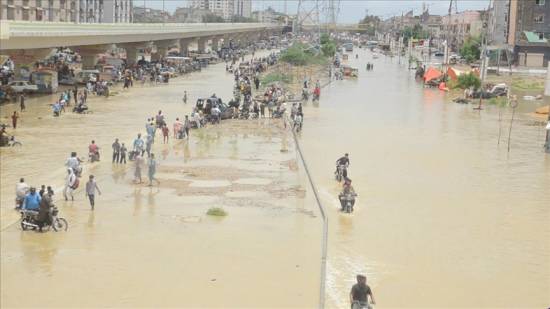Army and paramilitary troops were called in to join the relief and rescue operations after fresh rain spells and flash floods inundated most parts of Pakistan's commercial capital Karachi on Monday.
Another five people lost their lives in rain-related accidents in Karachi, home to 20 million people, as widespread downpours along with flash floods and windstorms inundated major roads, underpasses, and streets in the sprawling metropolis, officials said.
The hours-long heavy rain that eclipsed the festivities of Eid ul-Adha, one of the two main Muslim festivals, submerged low-lying areas in the city's eastern and central districts and flooded the southern district housing major government buildings and offices.
The relentless downpours and heavy winds also knocked down power lines and trees in different parts of the metropolis, with authorities warning citizens not to unnecessarily venture out to avoid accidents.
Footage aired on local television channels showed army and paramilitary troops struggling to drain out rainwaters from the main roads through heavy machinery.
At least four men were killed by electrocution, while one died due to a wall collapse in different city areas, bringing the overall toll to 115 since June 1, according to the official tally.
The Meteorological Department has forecast further rains as a new weather system is heading toward southern Pakistan, which would last until July 19.
Meanwhile, Prime Minister Shehbaz Sharif said he was “deeply saddened” by the damage wrought by the torrential rains in Karachi, the capital of southern Sindh province.
“I am confident that Sindh government will rise to the occasion and bring life back to normal under the able leadership of CM (chief minister) Sindh. Have offered to extend every possible support,” the premier tweeted.
Monsoon rains have long been wreaking havoc on Pakistan in terms of human casualties, and destruction of already fragile infrastructures. Climate change has further increased their frequency, ferocity and unpredictability in recent years.
The South Asian nuclear country has received 87% more rains this monsoon season so far compared to the past year, according to the Ministry of Environment and Climate Change.
Southwestern Balochistan province and northern Gilgit-Baltistan region were the worst hit where massive downpours and flash floods washed away bridges and houses, caused landslides and disconnected many towns and villages from the rest of the country last week.
Torrential downpours have killed 62 people in Balochistan province alone Since June 1./aa


